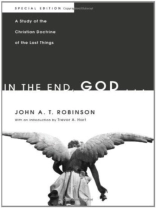‘Eschatology is the explication of what must be true of the end, both of history and of the individual, if God is to be the God of the biblical faith. All eschatological statements can finally be reduced to, and their validity tested by, sentences beginning: ‘In the end, God . . .”
J. A. T. Robinson
The God revealed in Israel’s story is the Lord of history–a God with good purposes for his creation and a God capable of bringing those purposes to pass. All biblical eschatology arises from this fundamental theological insight. If God is this God then what shape must the future have?
John A. T. Robinson explores biblical eschatology with an eye both to the text and to contemporary culture. Revealing the foundation of eschatology to be the experience of God by the community of faith, he calls readers to embrace the eschatological vision of the Bible, but to do so in a way that is alert to its mythic character.
In the course of these explorations Robinson also lays bare his own theology of universal salvation. But, contrary to what one may expect, this universalism is one that seeks to take both human freedom and the reality of hell with the utmost seriousness.
This special edition of John A. T. Robinson’s classic text also includes a debate between Robinson and Thomas F. Torrance (played out across three articles from the Scottish Journal of Theology in 1949), an extended introduction by Professor Trevor Hart (University of St Andrews, Scotland), and a foreword by Gregory Mac Donald (author of The Evangelical Universalist).
Про автора
Trevor Hart is Rector of Saint Andrew’s Episcopal Church and Honorary Professor at the University of St Andrews. His recent publications include Between the Image and the Word: Theological Engagements with Imagination, Literature, and Language (2013) and Making Good: Creation, Creativity, and Artistry (2014).







![Обкладинка Brian Schrag & Julisa Rowe: Community Arts for God's Purposes [Chinese] 貼近神心意的社群藝術 Обкладинка Brian Schrag & Julisa Rowe: Community Arts for God's Purposes [Chinese] 貼近神心意的社群藝術](https://static.worldofdigitals.com/thumb_webp/740/9781645083740.webp)




